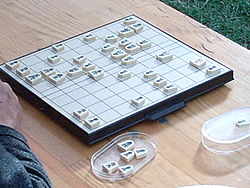Ever happened that you take your car to the mechanic and you meet the person serving you does not seem to have no idea what happens, but when the "master "Then then proposes some solutions? Or when you go to a hospital and a resident who serves you will explore a thousand times but can not seem to hit it at a diagnosis, and when it's "doctor" almost nomas to see and have two or three possible diagnoses?. Well, a group of Japanese researchers led by Dr. Keiji Tanaka, and included X. Wan, H. Nakatani, K. Ueno, T. Asamizuya and K. Cheng decided to investigate whether they could detect differences in brain function between novices and experts. To achieve this investigated Japanese players on a chess-like game called Shogi. They published their findings in the journal Science in January of this year.
The scientists decided to investigate this particular game because it has well-defined rules to follow and you can be making expert as you practice more. In the study using fMRI, we explored a number of conditions including comparing the brain activation by detecting the position of a particular piece and make a sensory-motor task. But the most important condition was to compare brain activation between novices and experts during the rapid generation of the most appropriate next move. That is, given a position on the board, decide within a period of two seconds what would be the next best move.
Well, the researchers found as expected a stream of activations throughout the brain. But as they were removing activations related to different cognitive processes, they reported that only two activations were correlated with the degree of experience of subjects. One was the activation in a brain region called the precuneus which is located in the parietal lobe and activated during the perception of patterns of pieces on the board, and the other was the caudate nucleus, part of the basal ganglia of brain, and activated during the rapid generation of the next best move. They also found that the activity of these two areas covariate for relevant tasks, which suggested to the authors that when skilled players analyze a scenario to run the next play, the precuneus, caudate circuit implements an automatic process and implied that allows the player to make a quick and effective.
In panel D we can see the differences in the caudate nucleus among professionals and novices in the task of making the movement more effective taking only two seconds to decide.
These results suggest that as one goes by an expert, the brain will strengthen this functional circuit that allows quick decisions just to take a look at a specific scenario in which a subject is an expert. According to the authors that unfolds over a long period, about ten years, and also is specific to the information on which he trained. This suggests that the power to make quick decisions as a mechanic, not going to make quick decisions to leave as a physician or the physician and psychologist, or this as a lawyer. Or what is the same, to finish as I started as "shoemaker to your shoes."




0 comments:
Post a Comment